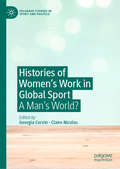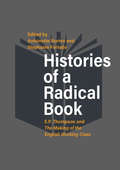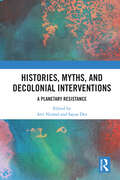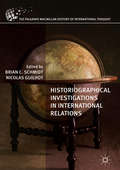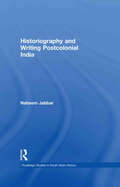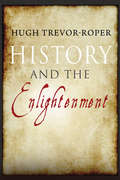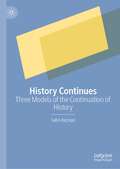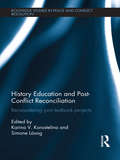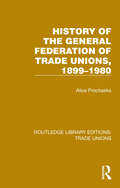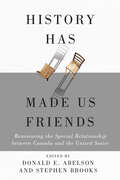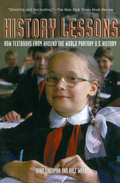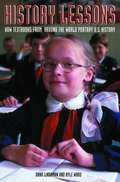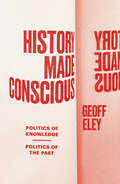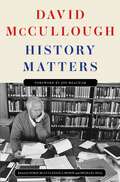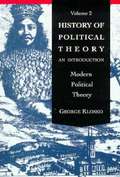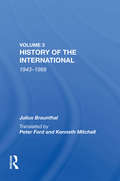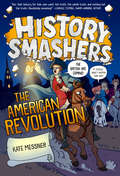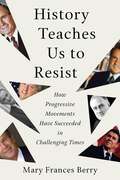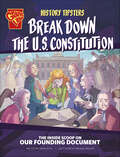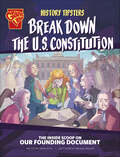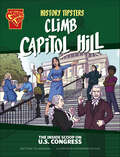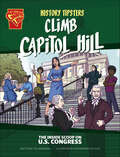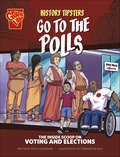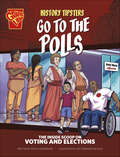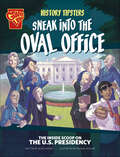- Table View
- List View
Histories of Women's Work in Global Sport: A Man’s World? (Palgrave Studies in Sport and Politics)
by Georgia Cervin Claire NicolasSport has never been a man’s world. As this volume shows, women have served key roles not only as athletes and spectators, but as administrators, workers, decision-makers, and leaders in sporting organizations around the world. Contributors excavate scarce archival material to uncover histories of women’s work in sport, from swimming teachers in nineteenth-century England to national sports administrators in twentieth-century Côte d’Ivoire, and many places in between. Their work has been varied, holding roles as teachers, wives, and secretaries in sporting contexts around the world, often with diplomatic functions—including at the 1968 and 1992 Olympic Games. Finally, this collection shows how gender initiatives have developed in sporting institutions in Europe and international sport federations today. With a foreword by Grégory Quin and afterword by Anaïs Bohuon, this is a pioneering study into gender and women’s work in global sport.
Histories of a Radical Book: E. P. Thompson and <em>The Making of the English Working Class</em>
by Antoinette Burton and Stephanie FortadoFor better or worse, E.P. Thompson’s monumental book The Making of the English Working Class has played an essential role in shaping the intellectual lives of generations of readers since its original publication in 1963. This collected volume explores the complex impact of Thompson’s book, both as an intellectual project and material object, relating it to the social and cultural history of the book form itself—an enduring artifact of English history.
Histories, Myths and Decolonial Interventions: A Planetary Resistance
by Arti Nirmal Sayan DeyThis book explores postcolonial myths and histories within colonially structured narratives which persist and are carried in culture, language and history in various parts of the world. It analyses constructions of identities, stereotypes and mythical fantasies in post-colonial society. Exploring a wide range of themes including the appropriation and use of language, myths of decolonialization and nationalism and the colonial influence on systems of academic knowledge, the book focuses on how these myths reinforce, subvert and appropriate colonial binaries for the articulation of the post-colonial self. With essays which study narratives of emigrants in Argentina, the colonial mythology in the Dodecanese in Italy, and the mythico-narratives of island insularity in contemporary Sri Lanka among others, this volume emphasizes the role of indigenous studies in building a postcolonial consciousness. This book will be of interest to scholars and researchers of post-colonial studies, cultural studies, literature, history, political science and sociology.
Historiographical Investigations in International Relations (The Palgrave Macmillan History of International Thought)
by Nicolas Guilhot Brian C. SchmidtThis book critically investigates the historiography of International Relations. For the past fifteen years, the field has witnessed the development of a strong interest in the history of the discipline. The chapters in this edited volume, written by some of the field’s preeminent disciplinary historians, all manifest the best of an innovative and exciting generation of scholarship on the history of the discipline of International Relations. One of the objectives of this volume is to take stock of the historical turn. Yet this volume is not simply a stock-taking exercise, as it also intends to identify the limitations and blind spots of the recent historiographical literature. The chapters consider a range of diverse thinkers and examine their impact on understanding various dimensions of the field’s history.
Historiography and Writing Postcolonial India (Routledge Studies in South Asian History)
by Naheem JabbarA critical examination of post-colonial Indian history-writing. In the years preceding formal Independence from British colonial rule, Indians found themselves responding to the panorama of sin and suffering that constituted the modern present in a variety of imaginative ways. This book is a critical analysis of the uses made of India’s often millennial past by nationalist ideologues who sought a specific solution to India’s predicament on its way to becoming a post-colonial state. From independence to the present, it considers the competing visions of India’s liberation from her apocalyptical present to be found in the thinking of Gandhi, V. D. Savarkar, Nehru and B. R. Ambedkar as well as V. S. Naipaul and Salman Rushdie. It examines some of the archetypal elements in historical consciousness that find their echo in often brutal unhistorical ways in everyday life. This book is a valuable resource for researchers interested in South Asian History, Historiography or Theory of History, Cultural Studies, English Literature, Post Colonial Writing and Literary Criticism.
History And The Enlightenment
by Hugh Trevor-RoperArguably the leading British historian of his generation, Hugh Trevor-Roper (1914-2003) is most celebrated and admired as the author of essays. This volume brings together some of the most original and radical writings of his career--many hitherto inaccessible, one never before published, all demonstrating his piercing intellect, urbane wit, and gift for elegant, vivid narrative. This collection focuses on the writing and understanding of history in the eighteenth century and on the great historians and the intellectual context that inspired or provoked their writings. It combines incisive discussion of such figures as Gibbon, Hume, and Carlyle with broad sweeps of analysis and explication. Essays on the Scottish Enlightenment and the Romantic movement are balanced by intimate portraits of lesser-known historians whose significance Trevor-Roper took particular delight in revealing.
History Continues: Three Models of the Continuation of History
by Sabri KiçmariDecades after Francis Fukuyama's 'end of history' thesis became famous, the conflicts and turmoil of history have returned; Dr. Kicmari, having seen his own native land erupt in a European civil war in the 1990s, has been thinking about these issues for many years. This book highlights the return of ideology to international relations, presenting harsh ideological models which challenge liberal democracy. This becomes even more relevant in light of the Russian invasion of Ukraine. The publication of this book aims to draw attention to the danger posed to world peace by ideological models alongside the need for commitment to strengthen democracy in the world, and should interest diplomats, journalists, and scholars.
History Education and Post-Conflict Reconciliation: Reconsidering Joint Textbook Projects (Routledge Studies in Peace and Conflict Resolution)
by Karina V. Korostelina Simone LässigThis book analyses the role of history education in conflict and post-conflict societies, describing common history textbook projects in Europe, the Balkans, the Caucasus, the Far East and the Middle East. Ever since the emergence of the modern school system and the implementation of compulsory education, textbooks have been seen as privileged media. The knowledge they convey is relatively persistent and moreover highly selective: every textbook author must choose and omit, condense, structure, reduce, and generalize information. Within this context, history textbooks are often at the centre of interest. There are unquestionably significant differences regarding homogeneity or plurality of interpretations when concepts of history education are compared internationally. This volume conducts a comparative analysis of common history projects in different countries and provides conceptual frameworks and methodological tools for enhancing the roles of these projects in the processes of conflict prevention and resolution. This book is timely, as issues of history education in conflict and post-conflict societies are becoming more popular with the increased realisation that unresolved disagreements about historical narratives can, and often do, lead to renewed conflict or even violence. This book will be of interest to students of peace studies and conflict resolution, political science, history, sociology, anthropology, social psychology, and international relations in general.
History General Federation Trade Unions, 1899-1980 (Routledge Library Editions: Trade Unions #18)
by Alice ProchaskaWhen this book was originally published in 1982 the General Federation of Trade Unions (GFTU) was an organisation which catered for some 40 unions with an aggregate membership of 490,000. The GFTU in the late 20th Century was a very different organisation from what its founders in 1899 hope it might become, but in both its early and later form, it holds a significant place in the history of British trade unionism. Its history, outlined in this book sheds much light on the history of labour relations and working-class organisation in this country as a whole. The book provides a framework within which the GFTU’s contribution to the history of British labour in the 20th Century may be understood.
History Has Made Us Friends: Reassessing the Special Relationship between Canada and the United States
by Donald E. Abelson and Stephen BrooksSeparated by the world’s longest land border and engaging in over three billion dollars in trade daily, Canada and the United States share security concerns, cultural interests, and a history spanning more than 250 years. Alan Rock, former Canadian ambassador to the United States, has said that this special relationship represents “a bond that is beyond practical. It borders on mystical.” The rise of nativist sentiment, however, has raised concerns over preserving this relationship.History Has Made Us Friends illuminates the nature and dynamics of Canada-US relations, examining their history, attributed meaning, and conceptualization. Contributors consider many angles and perspectives, including the impact of geopolitical change, to determine whether the relationship warrants the moniker “special.” They explore whether shared values and demographic similarities continue to cement the relationship, and if it still matters whether presidents and prime ministers get along.While things look different today from when President Kennedy declared, “What unites us is far greater than what divides us,” History Has Made Us Friends argues that the Canada-US relationship – often narrowly understood or dismissed as a relic of the past – continues to be unique and resilient.
History Lessons: How Textbooks from Around the World Portray U.S. History
by Dana Lindaman Kyle WardA &“fascinating&” look at what students in Russia, France, Iran, and other nations are taught about America (The New York Times Book Review). This &“timely and important&” book (History News Network) gives us a glimpse into classrooms across the globe, where opinions about the United States are first formed. History Lessons includes selections from textbooks and teaching materials used in Russia, France, Iran, Saudi Arabia, Cuba, Canada, and others, covering such events as the American Revolution, the Cuban Missile Crisis, the Iran hostage crisis, and the Korean War—providing some alternative viewpoints on the history of the United States from the time of the Viking explorers to the post-Cold War era. By juxtaposing starkly contrasting versions of the historical events we take for granted, History Lessons affords us a sometimes hilarious, often sobering look at what the world thinks about America&’s past. &“A brilliant idea.&” —Foreign Affairs
History Lessons: How Textbooks from around the World Portray U.S. History
by Dana Lindaman Kyle WardFrom the book: Instead of avoiding these difficult issues, [students' abilities to discuss and debate historical events] this work embraces them, with the intention of bringing back to the study of history those very things that make it so interesting and important. Instead of just reading about specific events, our readers have the opportunity to develop their own historical perspective and discover how individual biases, perspectives, and interpretations from around the world have shaped our understanding of specific historical events. Library Journal Textbooks are political documents, commissioned methods for molding students' viewpoints as well as instruments for conveying essential facts. By compiling excerpts of secondary-school manuals from largely Anglophone although not exclusively European sources, Ward (history, Vincennes Univ.) and Lindaman (a doctoral candidate at Harvard) provide a valuable service for those largely familiar with U.S. texts only. The use of post-Soviet Russian sources as well as Cuban and North Korean works is especially revealing. After an introduction delineating national differences among foreign publishers and the caveat that "most languages have passive constructions that allow them to speak of something without assigning blame," the authors submit selected historical passages ranging chronologically from the European discovery of the "New World" to the post-Cold War era. The book clearly shows that the United States developed within a global context and that U.S. history was especially intricately intertwined with that of its hemispheric neighbors. That said, there are few new insights for most well-read historians. All the texts assessed are from 1988 through 2001, which necessarily sets this work in time; it would be enlightening to see a similar study done ten years hence. Recommended for public libraries and teachers' college collections.-Frederick J. Augustyn Jr., Library of Congress Copyright 2004 Reed Business Information.
History Made Conscious: Politics of Knowledge, Politics of the Past
by Geoff EleyHow History has changed in the half-century since the 1960sDuring the last fifty years, the writing of history underwent two massive transformations. First, powered by Marxism and other materialist sociologies, the great social history wave instated the value of social explanation.Then, responding to new theoretical debates, the cultural turn upset many of those freshly earned certainties. Each challenge was profoundly informed by politics, from issues of class, gender, and race to those of identity, empire, and the postcolonial.The resulting controversies brought historians radically changed possibilities, expanding subject matters, unfamiliar approaches, greater openness to theory and other disciplines, a new place in the public culture. History Made Conscious offers snapshots of a discipline continuously rethinking its charge. How might we understand "the social" and "the cultural" together? How do we collaborate most fruitfully across disciplines? If we take theory seriously, how does that change what historians do? How should we think differently about politics?
History Matters
by David McCulloughIn this posthumous collection of thought-provoking essays—many never published before—Pulitzer Prize–winning historian and bestselling author David McCullough affirms the value of history, how we can be guided by its lessons, and the enduring legacy of American ideals.History Matters brings together selected essays by beloved historian David McCullough, some published here for the first time, written at different points over the course of his long career but all focused on the subject of his lifelong passion: the importance of history in understanding our present and future. Edited by McCullough&’s daughter, Dorie McCullough Lawson, and his longtime researcher, Michael Hill, History Matters is a tribute to a master historian and offers fresh insights into McCullough&’s enduring interests and writing life. The book also features a foreword by Jon Meacham. McCullough highlights the importance of character in political leaders, with Harry Truman and George Washington serving as exemplars of American values like optimism and determination. He shares his early influences, from the books he cherished in his youth to the people who mentored him. He also pays homage to those who inspired him, such as writer Paul Horgan and painter Thomas Eakins, illustrating the diverse influences on his writing as well as the influence of art. Rich with McCullough&’s signature grace, curiosity, and narrative gifts, these essays offer vital lessons in viewing history through the eyes of its participants, a perspective that McCullough believed was crucial to understanding the present as well as the past. History Matters is testament to McCullough&’s legacy as one of the great storytellers of this nation&’s history and of the lasting promise of American ideals.
History Of Political Theory An Introduction: Volume 2 Modern Political Theory
by George KloskoThe second volume of HISTORY OF POLITICAL THEORY provides an in-depth introduction to a select group of political thinkers. Professor Klosko weaves together excerpted materials with insightful commentary to create this thematically unified look at the central theoretical arguments of liberal political theory.
History Of The International: World Socialism 1943-1968
by Julius BraunthalWith this volume the history of the first century of the International reaches its conclusion. Originally I had intended that the trilogy would come to a close with the centenary of the founding of the First International in September 1964. But before I could finish writing the third volume the tragedy of the Communist revolution in Czechoslovakia had played itself out. 'The Spring of Prague' of 1968, having set in motion a process of change from a Communist dictatorship to a Socialist democracy, was followed within a few months by the invasion of the armies of the five Warsaw Pact powers to forestall reformation in Czechoslovakia. Both revolution and counter-revolution were events of the utmost significance for the history of Socialism-the revolution, for showing that it was possible for a Communist system of totalitarian dictatorship to be transformed without resort to force; and the counter-revolution, for showing how the regime in the Soviet Union has remained essentially unaltered since Stalin's death. The invasion of Czechoslovakia brutally called in question any optimistic perspective of development within the Soviet Union itself.
History Smashers: The American Revolution (History Smashers)
by Kate MessnerMyths! Lies! Secrets! Uncover the hidden truth behind the Revolutionary War with beloved educator/author Kate Messner. The fun mix of sidebars, illustrations, photos, and graphic panels make this perfect for fans of I Survived! and Nathan Hale's Hazardous Tales.On April 18, 1775, Paul Revere rode through Lexington and Concord, Massachusetts, shouting, "The British are coming!" to start the American Revolution.RIGHT?WRONG! Paul Revere made it to Lexington, but before he could complete his mission, he was captured!The truth is, dozens of Patriots rode around warning people about the Redcoats' plans that night. It was actually a man named Samuel Prescott who succeeded, alerting townspeople in Lexington and then moving on to Concord. But the Revolutionary War didn't officially start for more than a year after Prescott's ride. No joke.Discover the nonfiction series that smashes everything you thought you knew about history. Don't miss History Smashers: The Mayflower, Women's Right to Vote, Pearl Harbor, and Titanic.
History Teaches Us to Resist: How Progressive Movements Have Succeeded in Challenging Times
by Mary Frances BerryHistorian and civil rights activist proves how progressive movements can flourish even in conservative times.Despair and mourning after the election of an antagonistic or polarizing president, such as Donald Trump, is part of the push-pull of American politics. But in this incisive book, historian Mary Frances Berry shows that resistance to presidential administrations has led to positive change and the defeat of outrageous proposals, even in challenging times. Noting that all presidents, including ones considered progressive, sometimes require massive organization to affect policy decisions, Berry cites Indigenous peoples' protests against the Dakota pipeline during Barack Obama's administration as a modern example of successful resistance built on earlier actions.Beginning with Franklin D. Roosevelt, Berry discusses that president's refusal to prevent race discrimination in the defense industry during World War II and the subsequent March on Washington movement. She analyzes Lyndon Johnson, the war in Vietnam, and the antiwar movement and then examines Ronald Reagan's two terms, which offer stories of opposition to reactionary policies, such as ignoring the AIDS crisis and retreating on racial progress, to show how resistance can succeed.The prochoice protests during the George H. W. Bush administration and the opposition to Bill Clinton's "Don't Ask, Don't Tell" policy, as well as his budget cuts and welfare reform, are also discussed, as are protests against the war in Iraq and the Patriot Act during George W. Bush's presidency. Throughout these varied examples, Berry underscores that even when resistance doesn't achieve all the goals of a particular movement, it often plants a seed that comes to fruition later.Berry also shares experiences from her six decades as an activist in various movements, including protesting the Vietnam War and advocating for the Free South Africa and civil rights movements, which provides an additional layer of insight from someone who was there. And as a result of having served in five presidential administrations, Berry brings an insider's knowledge of government.History Teaches Us to Resist is an essential book for our times which attests to the power of resistance. It proves to us through myriad historical examples that protest is an essential ingredient of politics, and that progressive movements can and will flourish, even in perilous times.
History Tipsters Break Down the U.S. Constitution: The Inside Scoop on Our Founding Document (History Tipsters)
by Sara LattaThe history of the United States goes back hundreds of years. In that time, the country has changed and grown a great deal. But it all began with one document. Follow historical figures in this graphic novel as they break down the U.S. Constitution and get the juiciest tips on how the document—and the nation—has changed over time.
History Tipsters Break Down the U.S. Constitution: The Inside Scoop on Our Founding Document (History Tipsters)
by Sara LattaThe history of the United States goes back hundreds of years. In that time, the country has changed and grown a great deal. But it all began with one document. Follow historical figures in this graphic novel as they break down the U.S. Constitution and get the juiciest tips on how the document—and the nation—has changed over time.
History Tipsters Climb Capitol Hill: The Inside Scoop on U.S. Congress (History Tipsters)
by Ted AndersonTake a trip to Capitol Hill, where the most important decisions in the United States are made. Jane Representative can answer all your questions. How was Congress formed? What do senators and representatives do? How do they get elected? Get a first-hand look into Congress, along with some inside tips on history with this fun graphic novel!
History Tipsters Climb Capitol Hill: The Inside Scoop on U.S. Congress (History Tipsters)
by Ted AndersonTake a trip to Capitol Hill, where the most important decisions in the United States are made. Jane Representative can answer all your questions. How was Congress formed? What do senators and representatives do? How do they get elected? Get a first-hand look into Congress, along with some inside tips on history with this fun graphic novel!
History Tipsters Go to the Polls: The Inside Scoop on Voting and Elections (History Tipsters)
by Jessica GundersonToday, the right to vote might seem like an obvious part of our democracy. But the struggle for this basic right goes back hundreds of years. Take a tour through the ages to meet the people who shaped our current elections and voting rights. Get the hottest tips on how history was made in this fun graphic novel.
History Tipsters Go to the Polls: The Inside Scoop on Voting and Elections (History Tipsters)
by Jessica GundersonToday, the right to vote might seem like an obvious part of our democracy. But the struggle for this basic right goes back hundreds of years. Take a tour through the ages to meet the people who shaped our current elections and voting rights. Get the hottest tips on how history was made in this fun graphic novel.
History Tipsters Sneak into the Oval Office: The Inside Scoop on the U.S. Presidency (History Tipsters)
by Blake HoenaPeek inside the most important office in the country! Today, the president of the United States is one of the most powerful people in the world, but before America was a country, ruling royalty was the norm. Let the U.S. presidents of the past and present lead you through the history of their office and how it changed over time in this fun graphic novel.
